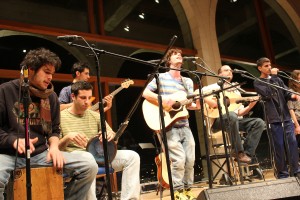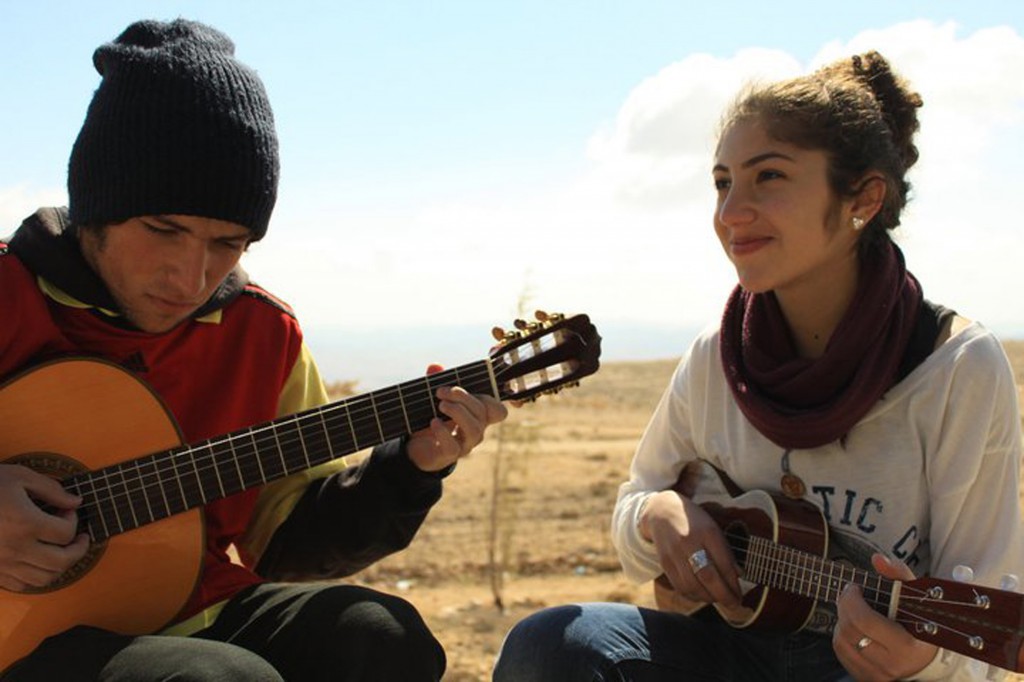Music Interview: In a “Heartbeat”
By Glenn Rifkin
Heartbeat is an international non-profit organization that is aimed at uniting Israeli and Palestinian musicians, educators, and students in order to transform conflict through the power of music.
On February 21, a group of young Palestinian and Israeli musicians will commence a U.S. tour with 15 concerts slated between Vermont and Washington, DC. The group represents Heartbeat, a Jeruslem-based, youth music community, and these artists, between the ages of 17 and 21, will perform at universities, music halls, and churches and synagogues. Avi Salloway, a singer/songwriter and social activist based in Cambridge, is Heartbeat’s global ambassador, and he spoke with Arts Fuse‘s Glenn Rifkin about the upcoming tour.
Arts Fuse: What is Heartbeat?
Avi Salloway: Heartbeat is an international non-profit organization that is aimed at uniting Israeli and Palestinian musicians, educators, and students in order to transform conflict through the power of music. It was founded in 2007 in Jerusalem by Aaron Shneyer, the son of a rabbi from Washington, D.C., and the executive director. His idea was to bring together young Israeli and Palestinian musicians and let them work together, hear each other and share a musical dialogue. By sharing a sustained, music-based dialogue, Heartbeat youth develop non-violent tools to express themselves and become voices for their communities. It operates on a tiny budget and is a mostly volunteer organization with programs in Jerusalem, Haifa, and Jaffa.
AF: How did you get involved in this?
Avi Salloway: I met Ami Yares, one of Heartbeat’s program directors, at a concert in Providence (there are two directors, Ami is an expat American Jew and the other director, Tamer Omari, is Palestinian). I’m a musician and we started talking about Israel and Palestine and music and I expressed interest in traveling over there to work on a music project. He invited me to come and work with him. My role now is as a global ambassador for Heartbeat, and I work to put the message into a global context. For example, I’m the producer of this tour, and through it, we’re hoping to build awareness and support for the program and to inspire people to build relationships all over the world. When I was in Israel, I worked as a facilitator, working with the artists on writing and recording their music.
AF: Given the seeming impossibility of resolving this conflict, how does Heartbeat address this daunting issue?
Avi Salloway: We’ve worked with more than 100 different artists between the ages of 14 and 22. They come from all over Israel and the West Bank. Heartbeat creates space for them to have a safe dialogue along with a musical collaboration. When they first arrive, we begin with a moment of silence so they can get a sense that this is a safe space. We then have improvisational jam sessions, which develop into writing sessions. And if you think about the process of making good music together, the underlying qualities that must be present are respect, listening, and space. It is parallel to any honest communication among people. Whereas words tend to be definitive, tie you into a box, and are often harsh, music is more liquid and doesn’t hold the same boundaries as the political landscape.
AF: What is it like when the youth first come together?
Avi Salloway: It’s different for each person depending on their upbringing and their families. It can be very tense, very aggressive. After all, these are very opinionated people. For example, when I was there, I recruited some Palestinian rappers to come to one of our sessions. There was a lot of ego in the room, and it played out in the intensity and volume and aggressiveness of the rapping. After a few hours of jamming together, this was diffused in some ways, enough to get them to come back for another session. They were more open to coming back. All this led to a retreat in the Negev desert writing songs together, and it has all led to some lasting friendships.
AF: Are they all pretty defensive when they first arrive?
Avi Salloway: No. Siwar Mansour, who is a Palestinian artist living in Israel, went to an all-Jewish school her whole life. When she came to Heartbeat, this was not new ground for her, she had already been living in this situation. It shaped her identity. She is just genuine and sweet and didn’t have the same hostility as some of the other artists. So there’s a wide spectrum of people we work with. No one has been asked to leave, but we have had a few who just left on their own or just stopped showing up.
AF: We’ve heard of other dialogue programs aimed at bringing these two sides together. How is Heartbeat different?
Avi Salloway: Yes, there have been other efforts to bring people together through sports or drama or music. But Heartbeat is the first organization to bring Jewish and Palestinian youth musicians together through modern and popular music, which is often what the youth are most connected to. There are other programs that bring together classical music, but Heartbeat is at the forefront with modern music.
AF: Is this reflected on the Heartbeat tour?
Avi Salloway: Yes, the music they are going to perform on the tour is their own original music that they’ve written. It’s their own voices. That’s a big part of our program, to empower the artist to realize the strength of words and music and how a song, for example “Bukrash fi Mish Mish” which is the latest single, can extend way beyond the room in which it was created. The song has had more than 30,000 views on YouTube.
Still, some cynics might think this is all well and good but will have little impact in this stifling political situation.
After so many years of war, we’re creating the space—it’s not an immediate quick fix or solution—but it’s a space where conversations can start, where songs can be co-written together. A song like “Bukrash fi Mish Mish” going viral, that’s the way we’re going to build a lasting peace by having person to person connections. Less than 5 percent of the population in the region have these person to person interactions with meaningful dialogue, and that’s what we’re investing in, what we’re all about, creating a conversation and a song.
AF: What language are the songs written in?
Avi Salloway: Arabic, Hebrew, and English.
AF: How skilled are these young musicians?
Avi Salloway: The artists coming on the tour are some of the best artists we work with. They are not just talented musicians but they are really inspired and creative kids. In general, we have a mix of ability in terms of the artists we work with. We invite anyone who wishes to come to Heartbeat. The performances are usually by the best musicians, but the retreats and workshops are open to everyone.
AF: Are you finding lasting relationships emerging from all this?
Avi Salloway: Absolutely. These are real and lasting friendships. They are on Facebook writing to each other, sharing new song ideas outside of Heartbeat meetings. They are very instrumental in the success of the program. We find the most openness from the youth. They are still growing into themselves and have yet to become definitely jaded and angry. They are the hope of Heartbeat and of the region.
AF: What is the outcome you’d like to see from the Heartbeat experience?
Avi Salloway: The optimistic hope is already being realized, that these artists have a transformative experience, build relationships that mean something to them, and take this back to their communities and families. It’s the critical mass theory, that this connection trickles into their lives and then into future generations and into the leadership of Israel and Palestine. The U.S. tour is designed to bring this message to the world, that this is happening on the ground, that musicians are interacting with respect and a shared purpose and we need the rest of the world to help us expand this as much as we can. If we can bring that meaningful dialogue up from just 5 percent to 20 percent to 25 percent, we could reach a critical mass for transformation.
Here is the tour schedule:
2/21 – Burlington, VT – University of Vermont
2/22 – Bennington, VT – Bennington College
2/23 – Concord, MA – First Parish in Concord
2/24 – Worcester, MA – Clark University
2/25 – Boston, MA – Boston University
2/26 – Waltham, MA – Brandeis University
2/27 – Lewiston, ME – Bates College
2/28 – Providence, RI – Brown University
3/1 – NYC – Le Poisson Rouge
3/3 – New Haven, CT – Yale University
3/5 – Washington, DC – Busboys and Poets
3/6 – Washington, DC – US State Department
3/6 – Washington, DC – American University
3/7 – Penn Valley, PA – Beth Am Israel



